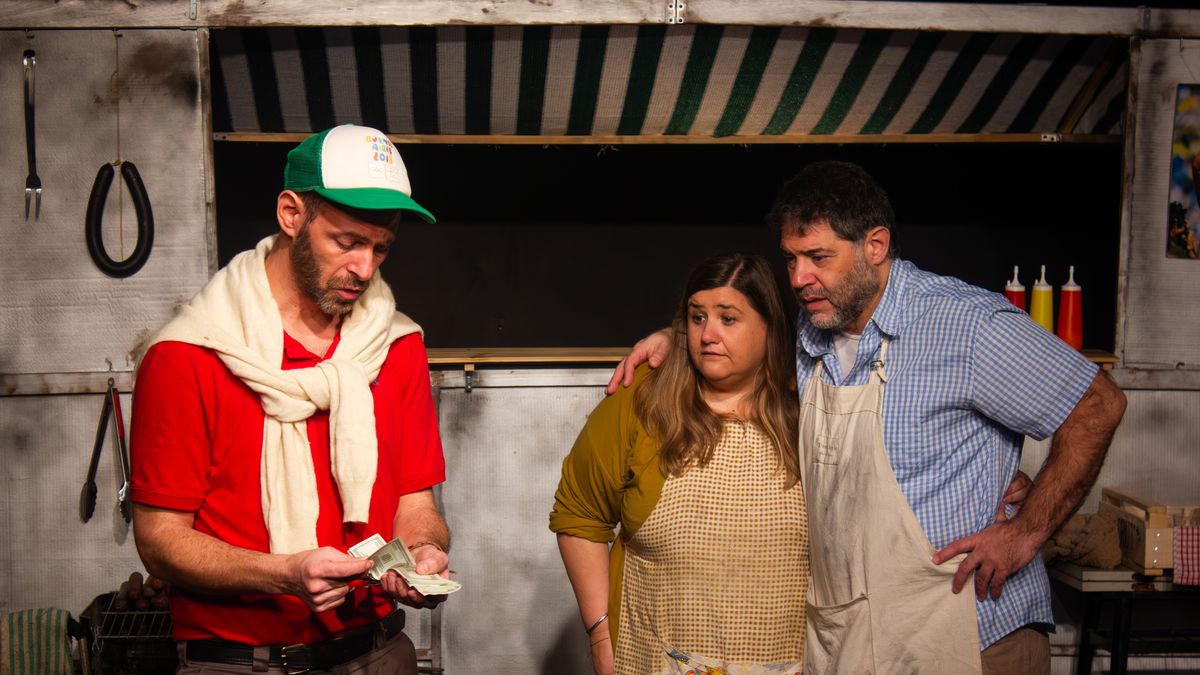“I see some hypocrisy with respect to the popular and that there is a romantization of that culture, but at the same time it is degraded. They look with fascination cultural forms of the central countries and denigrate the same,” says Alejandro Lifschitzauthor and director of “La Changuita”, A work that takes place in a Costanera cart. The work is about the economic crisis, the farm culture and the loss of identity of a couple of workers.
You can see on Friday and October at 8:30 p.m. in Fandango Theater, Luis Viale and Acoyte, with performances of Javier Barceló, Graciana de Lamadrid, Alejandro Lifschitz and Aníbal Tamburri. We talked with Lifschitz.
Journalist: Where did your desire to get into the Universe of the Post appeared in Costanera Sur?
Alejandro Lifschitz: The little position in Costanera Sur was very attractive for several reasons. In principle, the scenic device that places the viewer inside the cart, with the dispatch window towards the bottom of the stage, forces the characters to turn their backs on the public at the time of attending. It seemed very suggestive to generate a kind of deformed mirror: when the character is in front of the public, he turns his back on imaginary customers, and vice versa. That game mirves the world of fiction with the public. I also had to transgress that classic scenic imperative of “not turning my back on the public.” And, in the poetic, the scope of the little one is loaded with a symbology linked to the popular culture that I was interested in deploying.
Q.: Why nostalgia for the meat pitch?
TO THE: The hypothesis of the work is that this little position is the only one that maintains the historical tradition of the Costanera, while the rest of the colleagues changed towards culinary fashion proposals, losing the aesthetics of the popular. This cart tries to survive, but the clientele is inclined to the other options. That conflict with the environment enables a strong symbolism: the struggle of popular culture to survive. And, when it occurs in this way, it unfolds with a lot of irony and sarcasm.
Q.: What else would you say about Argentine popular culture in addition to choripán and that folklore?
TO THE: I am very interested in highlighting some hypocrisy with respect to the popular. I see that there is a romantization of that culture, but at the same time it is degraded; Meanwhile, cultural forms of the central countries are looked fascinated and denigrates the same. Soccer, tango, cumbia, Maradona, among others, are present in the work and allow to play with that permanent contradiction between love and contempt.
Q.: What happens to fashion, passenger or not, as a vegan that becomes cool? Why this globalized world threatens to become idiot?
TO THE: Beyond veganism itself, which can have a genuine foundation on care for animals, there is also a “cool” fashion that often seems imposed and whose main objective is to differentiate from the popular. It has to do with what I mentioned before: a certain desire Cipayo, an emboldening to claim the superficial and the immediacy proposed by social networks. That explains the phrase about this world proud to become idiot.
Q.: What other issues appear in addition to the economic crisis, the farm culture and the loss of identity? When did you write it and how did it resignified in Argentina today?
TO THE: Beyond the great social, political or cultural issues, I believe that the work has a very sensitive dimension of the human. They are broken, contradictory characters, which can generate tenderness, sadness or hate at the same time. That enables a theatricality that runs from any solemnity or loss of line. I started writing four years ago and I feel that political and social news gave a very powerful validity to its themes: the loss of dignity in exchange for some foreign morlaquitos, the presence of social networks ordering a new common sense, and the struggle of popular culture to survive.
Q.: How do you see theater and culture?
TO THE: The theater, in particular, and culture in general are going through a very complicated moment due to the economic situation and the lack of public policies that foster it. However, in Argentina there is a very powerful tradition that makes the activity emerge more strongly. Personally, I feel that relationships are generated, both between those who produce theater and with the public, which have non -capitalist logics. That is, decisions are not addressed solely to economic benefit, although, of course, we all need to live on our work. That logic of production in itself, beyond any aesthetic or thematic discussion, already seems to me a true act of resistance in this context.
Source: Ambito
I am an author and journalist who has worked in the entertainment industry for over a decade. I currently work as a news editor at a major news website, and my focus is on covering the latest trends in entertainment. I also write occasional pieces for other outlets, and have authored two books about the entertainment industry.




